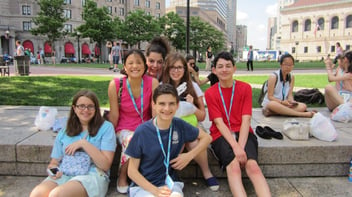At Catholic Memorial School, Critical Making Prepares Kids For A Future Not Yet Invented
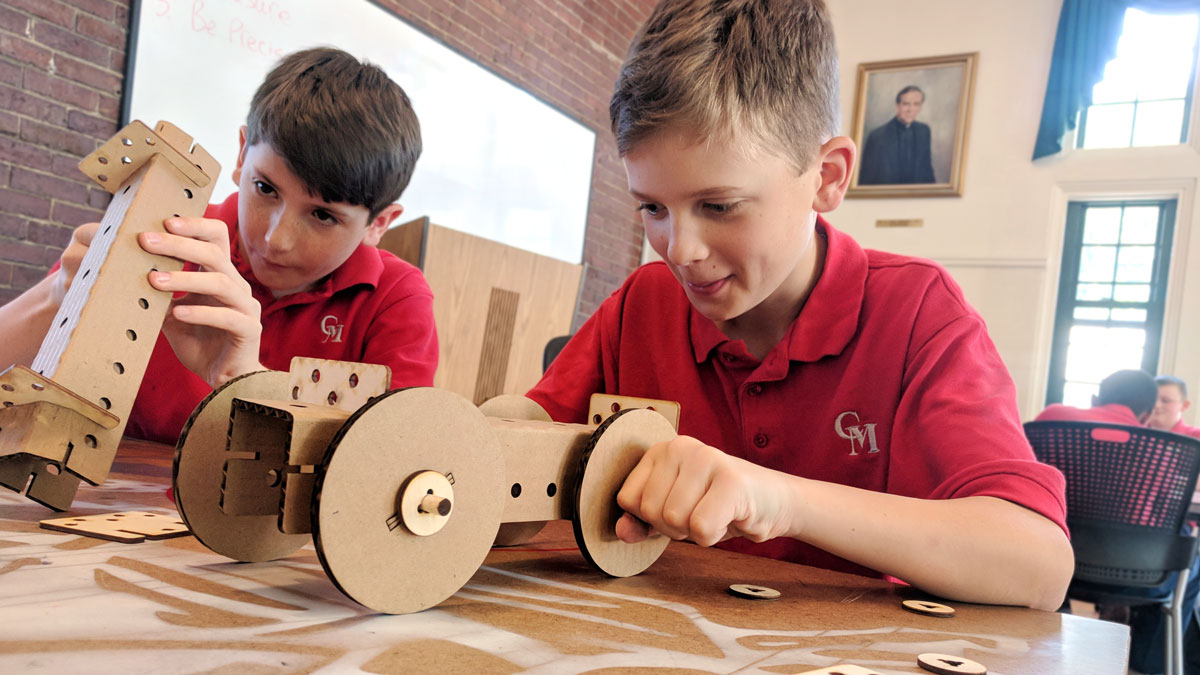
With today’s high school students graduating into a world shaped by the Fourth Industrial Revolution — a post-digital age that is blurring the boundaries of traditional technologies, producing information far faster than it can be consumed, and disrupting every industry in every country around the world — what must schools do to ensure that they are well prepared not just for college, but for jobs they will compete for that don’t yet exist?
At Catholic Memorial School, a Boston-based Catholic school for boys in grades 7-12, this question has been the source of a curricular and cultural revolution that involves building new skills-development and ways of thinking into their academics. But changing the way your school approaches teaching and learning is no easy feat. It requires vision, committed leadership, buy-in from teachers and families, and a partner who can provide guidance and expertise as you develop a strategy to execute the plan.
For Catholic Memorial and Head of School Peter Folan, EXPLO was a like-minded match whose vision for restoring curiosity and exploration to education could help put CM’s plans into action.
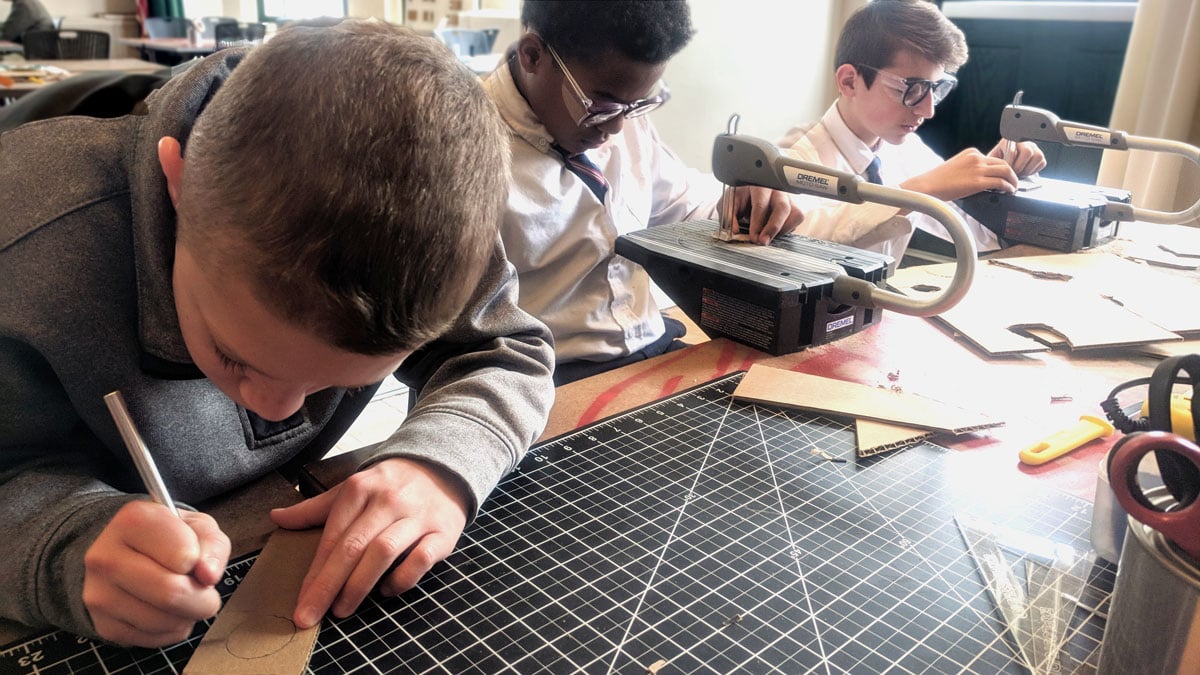
“The idea for us has always been, how do we take EXPLO’s entrepreneurial, innovative approach to teaching and learning and infuse that DNA into what we’re doing at Catholic Memorial?” Folan says. “Meeting with the EXPLO leadership really established that they were like-minded people, with similar visions for education. They are change agents who are willing to stop talking about what has to happen and who want to start trying to make things happen. And that’s rare.”
Re-making a School Through Critical Making
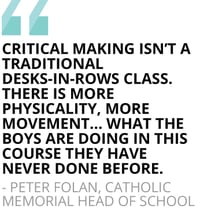 In 2017, after extensive planning and design, EXPLO and CM introduced a project-based learning curriculum to the school. Every seventh grade student was enrolled in Foundations of Critical Making, a course that begs them to get involved, get their hands dirty, and take ownership of their learning. Through daily, hands-on projects, students at CM develop crucial soft skills such as problem solving, collaboration, creativity, innovation, and revision — keys to success in the Fourth Industrial Revolution.
In 2017, after extensive planning and design, EXPLO and CM introduced a project-based learning curriculum to the school. Every seventh grade student was enrolled in Foundations of Critical Making, a course that begs them to get involved, get their hands dirty, and take ownership of their learning. Through daily, hands-on projects, students at CM develop crucial soft skills such as problem solving, collaboration, creativity, innovation, and revision — keys to success in the Fourth Industrial Revolution.
It’s quite different from the rest of the curriculum — and unlike any other courses Catholic Memorial has traditionally offered.
“Critical Making isn’t a traditional desks-in-rows class. There is more physicality, more movement,” Folan describes. “And it’s a daily practice of interdisciplinary thinking. What the boys are doing in this course they have never done before. They have to understand how to apply thinking and learning in new ways, across disciplines. They’ve got to learn to problem solve. They’ve got to learn to work on teams. They’ve got to learn to have relationships with each other. This is the perfect way of doing that.”
Process Over Product
Both EXPLO and CM want students fully immersed in the process of the project and not just the outcome. Students are not evaluated by each individual project, but by six traits: observation, communication, collaboration, innovation, perseverance, and feedback — “no-regret skills,” as EXPLO Creative Director Dave Hamilton likes to call them.
“I don’t actually care what their things look like,” Hamilton admits. “I think the biggest problem with project-based learning is that most often you are evaluated by what the thing looks like in the end. And the parents look at it, and maybe there’s glue dripping out, and maybe it’s collapsed on one side, but they have no idea what the process was or how many different ideas the kids had to come up with and overcome to present you with this product.”
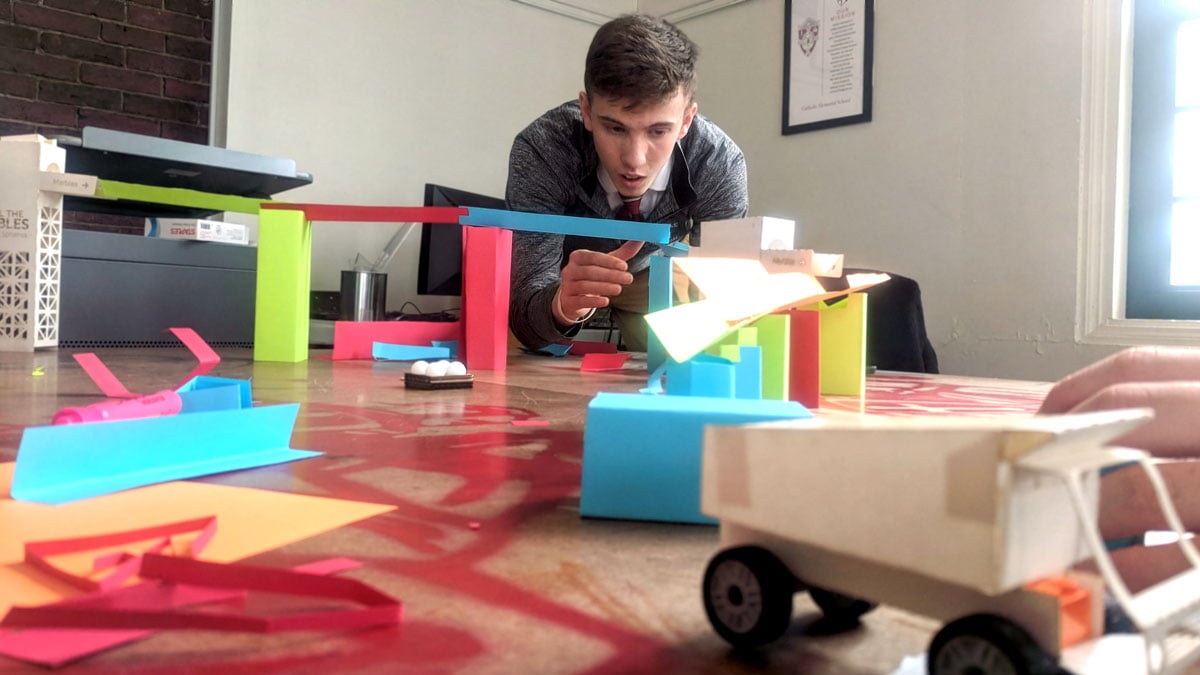
Getting kids to celebrate their own work in the moment, to understand what they are learning and where they are making purposeful decisions to make changes as a result of their own observations, is powerful and important. This is the driving principle behind EXPLO’s approach to education through exploration:
“That’s one of the reasons I like the name of our organization so much,” Hamilton says. “Exploration. I don’t think there is a better word out there. When education is going really well, I think it is exploration. I dont think it’s just discovery — there are many little discoveries along the way, but we would really like kids to honor and be excited about exploration.”
Where Other Schools Get it Wrong
There is no doubt in Folan’s mind that every school needs to be engaged in critical making. He knows it’s challenging and requires sacrifice to make true innovation happen, but he also thinks he has pinpointed why Catholic Memorial has experienced success in their efforts.
“Innovation space and STEM education is what is needed today, but I don’t believe many schools get it right," Folan says. “I think a lot of schools are investing a lot of money and resources into facilities, but they fail to see the value in the programming that should be done first. They rush to market with the space but have zero programming.”

And this — the importance of the intention and thoughtfulness in the creation of the curriculum and the process, and not simply the space where it happens accompanying high tech tools — is where the collaboration with EXPLO has made a sharp difference.
“With EXPLO, we went from ideation and reflection, to prototyping and creation,” Folan says. “And now we’ve created a comprehensive two-year middle school program that meets every day. I believe we have the only critical making program in the state.”
Reclaiming the Competitive Edge
That’s a lofty title to claim in Massachusetts, which U.S. News ranks as the top state for education in the United States. Facing competition from high-performing public schools, charter schools, and prep schools, Catholic Memorial leadership knew it had to mount a major campaign to retain a competitive edge and meet its enrollment goals.
“Most institutions are afraid to reflect upon their own constructs,” Folan says. “If we’re not looking at how we’re functioning, what we’re teaching, and why we’re teaching it [on a regular basis], then we’re not really providing our kids with what they need in a rapidly changing world. We need to be flexible and adaptive enough to embrace new ways of thinking and engaging that meet the way their brains are developing. Schools have to be willing to embrace change and ambiguity, but do so very intentionally and with an approach that is developmentally appropriate.
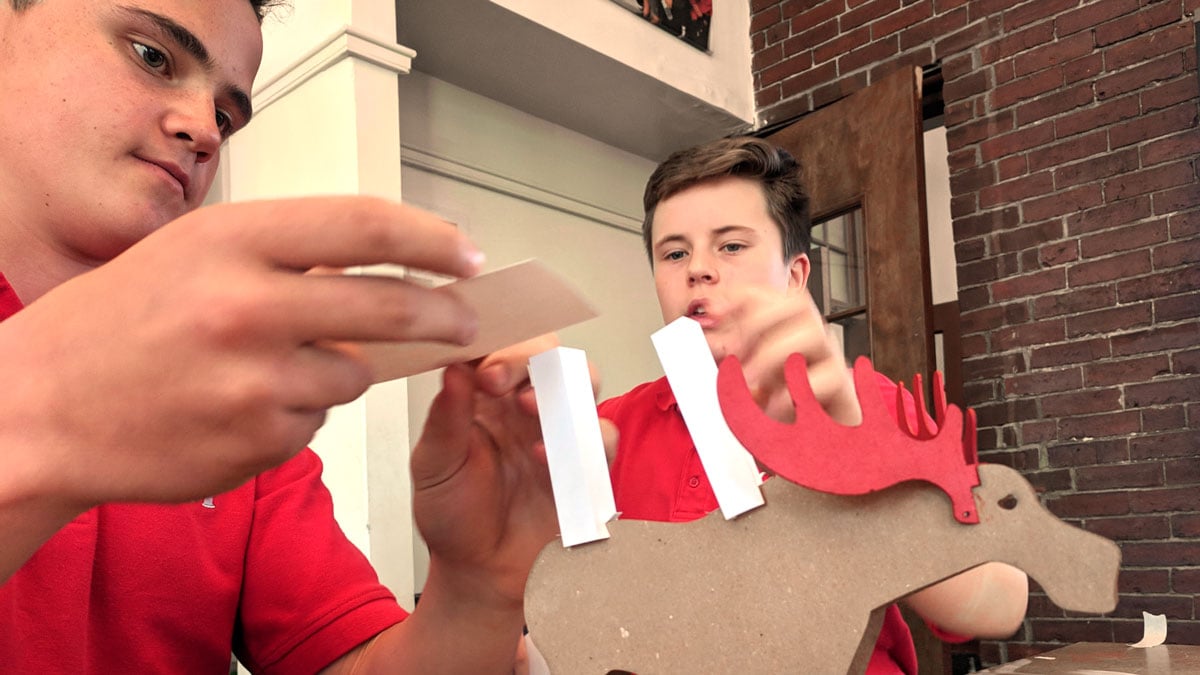
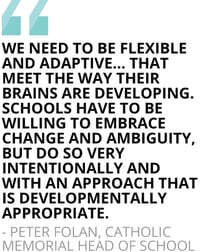 Instituting Critical Making meant a significant commitment of resources in every sense: time, space, finances, and personnel. It also required sacrifice.
Instituting Critical Making meant a significant commitment of resources in every sense: time, space, finances, and personnel. It also required sacrifice.
In order to fit Critical Making into the curriculum, CM had to cut the physical education class for its 7th grade, not an easy decision in any school, let alone one with an all boys population (nearly all of the boys continue to participate in school-sponsored sports). But Folan and the rest of the leadership at CM believed enough in the value of the course to take the leap.
“It came down to this being an institutional priority,” Folan says. “If we were going to find opportunities for our boys to engage in this kind of thinking and learning, which they need, we had to make a decision that it was going to replace something.”
The decision has served the school well. Over the past three years, Catholic Memorial has seen a 300 percent increase in its graduates attending Baron’s Most Selective Colleges. This year, 40 percent of graduates are attending 20 of the most selective colleges in the U.S.
And while area competitors are experiencing enrollment challenges, applications to CM and the number of young men enrolling at the school are both on the rise.
To top it all off, the Yawkey Foundations made a philanthropic commitment of $2.5 million — the largest gift in Catholic Memorial’s 61-year history — to support a new building on the 12.5-acre campus. The Center for Integrated and Applied Learning (“CIAL”) will create space designed specifically for 21st century skill building, including problem-solving, collaboration, and adaptability.
Making Magic Happen, Together
Schools are no stranger to consultants and outside organizations coming in to provide advice or counsel on topics from curriculum development to behavior management to diversity and inclusion. But these ad hoc partnerships can often fall flat among teachers and administrators who live their school’s mission every moment of every day.
“Bringing in outside educators into a school setting, that can actually go horribly wrong,” Folan admits. “People can feel threatened. The big challenge is to embrace outside thought leaders and bring them into a community and do it in a way that’s delicate, that’s slow in moments, and that welcomes them into a new way of thinking of doing.”
EXPLO met that challenge and really became equal partners. CM describes EXPLO as having the most willing and open people to think about how to make changes.
“I think a true partnership has to have reciprocity, in that you’re looking for partners who hold the same vision for education and can bring ideas and strengths to your organization that are going to make you better,” Folan says. “And because we had that, we were all willing to begin to change curricular ideas immediately, while simultaneously reflecting upon whether or not it was working.”
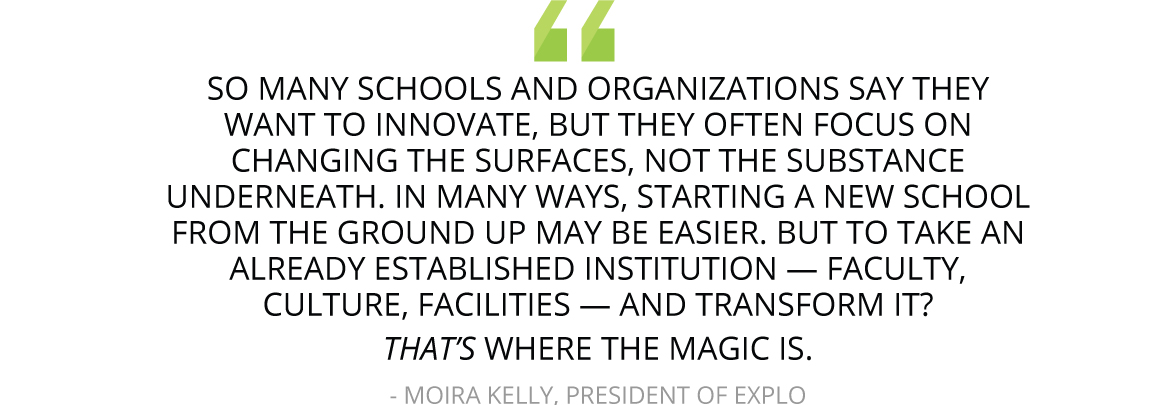
The success of the partnership between EXPLO and CM on Critical Making has led to a second course for eighth grade students, as well as professional development for the school’s educators, including workshops on how to ask questions and varying degrees of project based learning.
It’s a true partnership based on mutual respect that has been earned through commitment to shared values and goals to change the nature of education and schools.
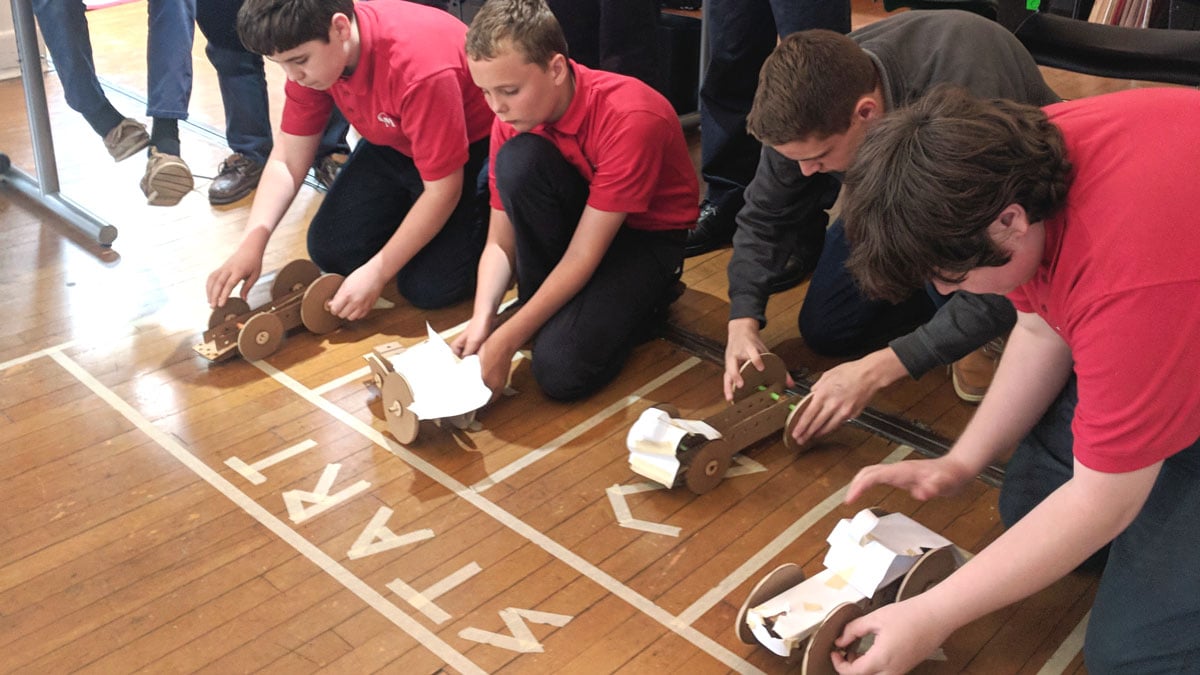
“So many schools and organizations say they want to innovate, but they often focus on changing the surfaces, not the substance underneath,” says EXPLO President Moira Kelly. “In many ways, starting a new school from the ground up may be easier. But to take an already established institution — faculty, culture, facilities — and transform it? That’s where the magic is.
“CM is a role model for other institutions. They have shown bravery in making bold moves that they couldn’t be sure would all result in success. That bravery is helping them build a courageous culture that is at the heart of continued innovation. I’m thrilled that EXPLO could play a part in this transformation.”

